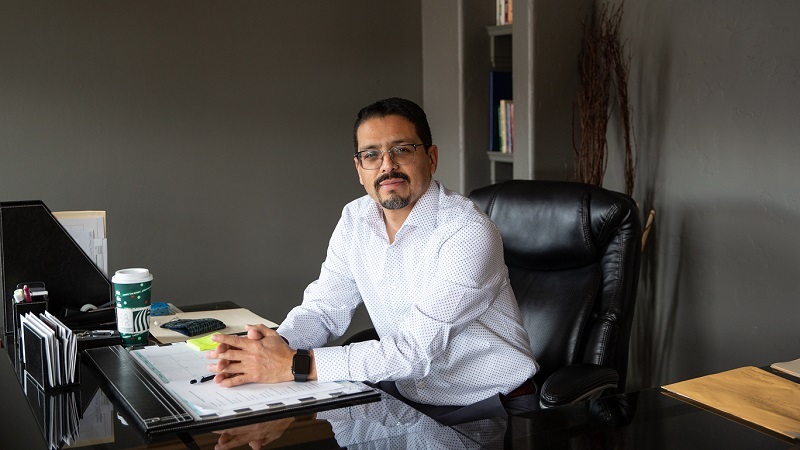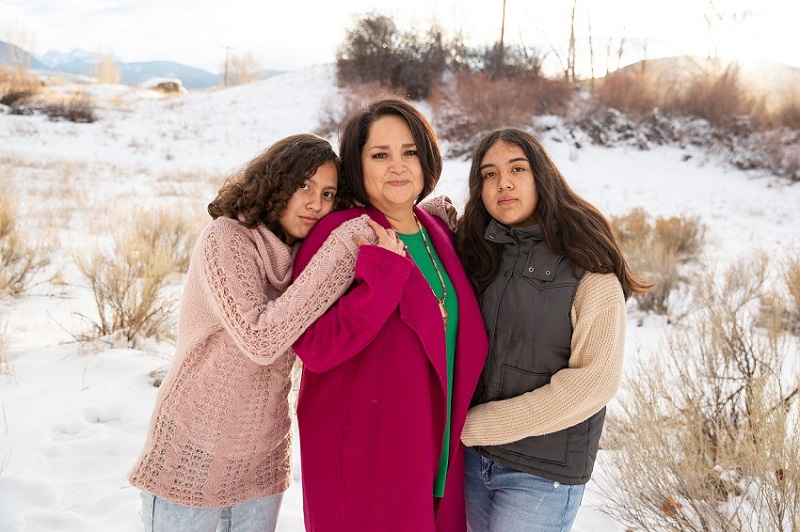
Josué Rubio, a pastor at Centro Cristiano Nueva Vida in Edwards, Colo., has worked diligently to provide services, resources and hope to the area immigrant community during the COVID-19 pandemic. Photos by Luna Anna Archey
Josué Rubio, a pastor at Centro Cristiano Nueva Vida in Edwards, Colo., has worked diligently to provide services, resources and hope to the area immigrant community during the COVID-19 pandemic. Photos by Luna Anna Archey
It was the barren shelves at the grocery store that worried Berenice most when the coronavirus pandemic hit last March. She worried about having enough food for her three children: Abdeal, age 9; Kendra, 6; and Greicy, 4.
Then, a week later, schools shut down in Eagle—a town of just over 6,000 halfway between Denver and Grand Junction, where Berenice and her husband Jesús live in a small trailer—and Berenice realized she would be responsible for overseeing her kids’ education. They were not prepared.
Kendra does not read yet, so to have her complete the school assignments, Berenice needed to read them out loud for Kendra and then help her with them. Abdeal needed Berenice’s help, too, but it was Greicy who most concerned Berenice. Her youngest child required near constant attention. The kitchen table became the sole workspace for the kids, but the arrangement was cramped and inconvenient since Berenice also used the table to serve meals.
“They didn’t concentrate; they wanted snacks all the time,” Berenice told me. “It was chaos.”
***
Remote learning was just one of the many pandemic-related challenges facing immigrants throughout Colorado like Berenice, who was born in Chihuahua, Mexico and moved to Eagle 10 years ago for Jesús’s job. The coronavirus has killed people in immigrant communities and communities of color at much higher rates than the general public, and left many out of work. Those without documentation—including Berenice and Jesús, whose last name is omitted here to protect their identities—were unable to qualify for unemployment benefits and excluded from the government stimulus checks.
Meanwhile, school closures have placed a greater burden on immigrant families who are more likely to have poor internet connectivity, parents unable to work from home, and cramped housing situations. For the roughly 10,000 immigrants in the Eagle River Valley, which sits along the I-70 corridor surrounded by mountains, a small church in the nearby town of Edwards run by a charismatic Mexican pastor named Josué Rubio has become an important source of support and hope for many of them.
Berenice and Jesús became regulars at Rubio’s church, New Life Christian Center (Centro Cristiano Nueva Vida), when they had their first child and were looking for a second family. That community has proven essential throughout the pandemic. The positive messages Rubio would send out on Facebook Live helped them feel connected to others and to a wider community. “In the middle of this madness, they brought us some peace,” Berenice said.
By early May, Rubio decided to transfer the church office’s phone line to his home because he was receiving so many calls. People called because they were depressed or anxious; because they had family members or friends who were in the hospital; because someone they loved had died. One boy called asking Rubio to pray for him. He was struggling in school, he said. His grades were suffering. He had no motivation.
“Winter will be hard,” Rubio told me. But he also sees the hardships wrought by the pandemic as an opportunity to emerge as a stronger, more resilient community. After all, he said: “We are living in extraordinary times.”
***
Rubio came to the Eagle River Valley in 1999 from the mountains of Chihuahua, Mexico where he ran a congregation in a rural town four hours from Chihuahua City. An Anglo pastor in Vail invited him and his wife, who grew up in New Mexico, to start a church that would serve the immigrant community that had grown around the local ski resorts.
From the beginning, Rubio saw the church’s role as more than spiritual; it had to help serve the wide-ranging needs of a community. “With one hand you have to preach, but with the other, you have to help,” he said.
Though Vail Resort, 25 miles down valley, and the surrounding tourism industry depended on immigrant workers, they were often stuck in low-wage jobs and struggled to find affordable housing amid the region’s soaring real estate market. Persistent poverty and financial stress led to a cascade of other problems, including low graduation rates, food insecurity and mental health issues. Meanwhile, Rubio saw how the systems that could help—whether the school district or public health officials—were not well connected with the immigrant community.
He wanted people to re-imagine what they believed was possible for themselves and their families, starting with a good education and economic stability. Through his church, Rubio began organizing community initiatives to further that goal. He invited county authorities to speak about local resources at Sunday services, and found ways to get people participating in the larger community: a clean-up crew for a segment of Highway 6, volunteering at the local senior center.
Over the years, Rubio saw more immigrants begin pursuing new opportunities, opening businesses and pursuing education. For Patricia Colín, an office administrator for the New Life Christian Center who came to Eagle 20 years ago from Mexico, seeing other immigrant women with successful professional careers has helped her inspire her own daughters, ages 11 and 14.
“They have to study,” Colín told me. “It’s not an option for them. The option is which career will they choose.”

Patricia Colín and her two daughters.
***
The pandemic is threatening all that progress. In March, when ski resorts, restaurants and hotels closed down, the economic impacts hit immigrants in the Eagle Valley hardest. Since many do not have documentation or live in mixed-status households, entire families were excluded from the federal aid intended to ease the burden of the pandemic. Many of them have since returned to work, but as infection rates in Colorado have surged in recent weeks, their livelihoods are hanging by a thread.
With the prospect of another shutdown and stay-at-home orders, many immigrant families in the valley have rented out their homes and are crowding together with other families to save money, according to Rubio. Fear, too, has taken a toll.
“We have people who have completely isolated themselves out of fear,” said Rubio. As winter approaches, he worries that many more immigrants will suffer a mental health crisis.
“For me, the challenge is not the pandemic itself,” Colín told me. “The challenge is how we as a church can help those people who are in need emotionally—and, to the extent that we can, financially—with the pandemic.”
Already, Sandra Macias, the youth director for the New Life Christian Center who also works in the Eagle County School District, is seeing immigrant students fall behind academically. The pandemic has widened what she calls the “access gap” between students with disparate economic resources. Who has a good internet connection and at least one parent at home now determines, more than ever, who succeeds and who struggles most with distance learning.
Macias commended the Eagle County School District’s effort to provide each student with a computer, but in households where both parents have to work outside the home, many kids have no supervision. “There is no one to be accountable to; no one there saying, ‘Okay, it’s 10 a.m., log in from your math class,’” Macias said.
“I know that my son has to be studying,” one parent told Macias, “but we also need to eat, we also need to pay the rent.”
Even in households where a parent can supervise online learning, kids are suffering academic setbacks. Before the pandemic, Colín’s daughter had good grades, but now she feels disconnected from her classes and from her peers, and her grades have dropped. When Colín asked her daughter why, she replied that she was struggling to pay attention and make sense of the online lessons. “Mom,” she said. “I don’t understand.”
***
Like many others in Eagle’s immigrant community, Berenice has learned to live with fear. Though she worries about her husband getting exposed to the virus at his job at the local recycling center, she knows the family depends on his income.
“I learned to live with that, and then I didn’t feel the fear as much,” she said. Summer helped, too. The weather was hot and sunny, and her kids could play outside.
But as the start of the new school year approached, and the likelihood of continued online learning became apparent, Berenice began thinking about how they could improve upon the kitchen table setup. They live in a small trailer with only one main living room, so the couple decided to use one wall at the back of the room to create a dedicated study area. They built a desk for each child so they could have their own space.
Berenice reached into her bag and pulled out her phone to show me a picture: three chairs tucked into a desk with dividers, creating three small workspaces, with shelves along the top holding books and a red ukulele. Everything looked bright and calm—the kind of space where a kid might even get excited about doing homework. Now, Abdeal and Kendra, the two oldest, sit at their desks, without bothering each other, headphones on, attending their virtual classes, while Greicy, the youngest, works in her coloring book or at another activity.
That kind of resourcefulness gives Rubio hope and motivation to strengthen his community involvement. In June he applied for a grant from the Colorado Health Foundation and secured funding for his latest initiative: the Vida Foundation, which he started to support local immigrant youth academically and train them to be leaders in the community.
In January, Rubio plans to launch two pilot initiatives: an after-school program where elementary-school kids can go for a healthy snack and mentorship, and a supervised homework hour for middle-school students where they also learn about leadership. “We want to help these kids do better in school so they can find their vocation and increase their opportunities,” Rubio said.
If the pandemic has upended life as we know it, maybe, Rubio thought, it could also unleash positive change. “We could stay and cry all day,” he said, “but something has to be done.”